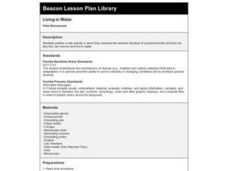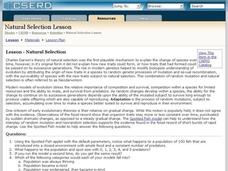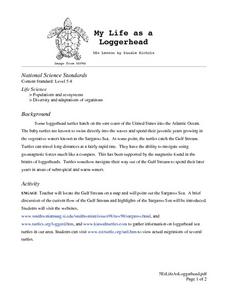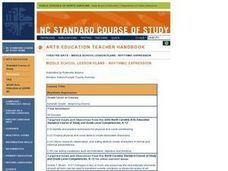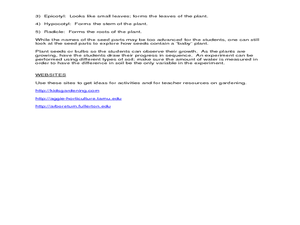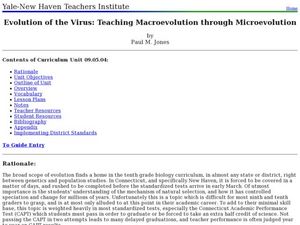Curated OER
Living in Water
Fourth graders perform a lab activity in which they examine the external structure of a preserved fish and find out why fish can survive and live in water. They perform a lab which is guided by a worksheet imbedded in this plan.
Curated OER
Coloration
Students conduct an experiment picking out colored vs. camoflauged toothpicks out of the grass. They list and describe different types of coloration and explain how coloration assists the great horned owl and the striped skunk survive.
Curated OER
Why Don't Whales Have Legs?
Students are given a variety of materials and are asked to design a heat loss experiment that results in a reasonable explanation of "Why don't whales have legs?" students work with the theory of natural selection.
Curated OER
Learning Activities: What Color Am I?
Pupils identify various species of anurans by their skin coloration. They describe how coloration contributes to survival.
Curated OER
Biology: Natural Selection
Students explore evolutionary processes and theories using the spotted fish applet. They observe what happens to fish in a closed environment with both food and predators. Students run the model several times and answer questions about...
Curated OER
Change by Chance?
Sixth graders are able to see the role of chance in evolution. The activity is similar to the party game "gossip" or "telephone." Students start off with a drawing of an animal which changes as they pass their copies of the animal to...
Curated OER
Habitats
Students are introduced to various animals and their habitats. In groups, they must determine which animal skin matches the correct animal and identify the texture. They discuss the reason for the texture and width of the skin to end...
Curated OER
My Life as a Loggerhead
Students discuss the current flow of the Gulf Stream and the characteristics of the Sargasso Sea. They visit websites to gather information on loggerhead sea turtles. Students imagine that they are newly hatched loggerhead turtles.
Curated OER
Rhythmic Expression
Students discover movement and expression to music/sound through a series of teacher-led exercises and role plays. This lesson is ideal for the middle school drama class with possibilities for adaptation to any level of drama or general...
Curated OER
Plant Pollination
Students investigate methods of pollination for various flowers. In this plant biology lesson, students learn the parts of a flower and form a hypothesis about the method of pollination for the flower. They determine the validity of...
Discovery Science Center
Kindergarten Observing, Comparing and Contrasting
Although this is a science lesson, it can be adapted to help meet Common Core standards in math as well. Starting scientists describe physical properties of objects and explore three forms of water. To address the Common Core, they can...
Curated OER
Too Bee Or Not To Bee
Students recognize that bees are important in the reproduction of plants and to the survival of animals. In this bee lesson plan, students become familiar with the parts of bees and how those adaptations help them pollinate plants....
Curated OER
Ben Franklin and the Rising Americans
Students prepare for and learn through a walking tour of Philadelphia. In this history activity, students support their studies with a field trip. This activity could be adapted to suit regions with other historic places or museums.
Curated OER
Bees
Middle schoolers design an experiment. In this bees lesson, students research pollination and work collaboratively to discover how bees aid in pollination. Middle schoolers use tomato plants and create experimental designs. Lesson...
Curated OER
Seeds of Wetland Life
Learners participate in several activities on seed exploration. For this biology lesson, students classify seeds according to their dispersal method. They explain the different adaptations plant have to disperse their seeds.
Curated OER
Evolution of the Virus: Teaching Macroevolution Through Microevolution
Students describe the anatomy of a virus. In this biology lesson, students compare and contrast the characteristics of bacteria and viruses. They discover the genetic adaptations of viruses over time.
Curated OER
Lesson Learned: Creating a Life Reports Project
Tap into the wisdom and knowledge of older members of the community with this New York Times plan. To warm up, learners write about and discuss advice they have been given. After reading "The Life Report," an op-ed column that asks older...
Baylor College
Food Webs
Explore various ecosystems from around the world as your class discovers the interdependence of all living things. Using the provided sets of ecosystem cards, young scientists work in small groups building food webs to demonstrate the...
Baylor College
Using Heat from the Sun
Let's heat things up! This simple experiment demonstrates for students the important role the sun plays in providing the earth with energy. Place one cup of water in direct sunlight and one in shade, then take measurements in order to...
Baylor College
Rainbow in the Room
Uncover the science behind the beautiful phenomena of rainbows with a simple demonstration. Shine light through different-sized containers of water as young scientists learn that rainbows occur when visible light is split up into its...
Baylor College
What Is the Water Cycle?
Small groups place sand and ice in a covered box, place the box in the sunlight, then observe as evaporation, condensation, and precipitation occur. These models serve as miniature water cycles and demonstrations of the three phases of...
Institute of Electrical and Electronics Engineers
Working with Watermills
In collaborative groups, emerging engineers or environmental scientists plan and construct a water wheel or watermill that rotates for a total of three minutes. Everything you need to carry out this lesson is included: objectives,...
Baylor College
Heart and Lungs
With a partner, youngsters measure their pulse and breathing rates, both at rest and after running in place for a minute. While this activity is not novel, the lesson plan includes a large-scale classroom graphing activity and other...
Institute of Electrical and Electronics Engineers
Popsicle Bridge
Using popsicle sticks and glue, groups must work together to design and build a bridge that can support weight and is aesthetically pleasing. The lesson begins by learners reading about different features of bridge architecture, followed...
Other popular searches
- Animal Adaptations
- Ocean Animal Adaptations
- Bird Beak Adaptation
- Plant Adaptations
- Behavioral Adaptations
- Adaptation and Evolution
- Bird Adaptations
- Insect Adaptations
- Plant and Animal Adaptation
- Fantasy Animal Adaptations
- Fish Adaptations
- Adaptation Habitat


